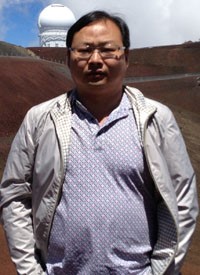题目:Dissecting Galaxy Ecosystems in Space and Time
报告人:李成 教授 (清华大学)
地点:紫金港校区西区海纳苑8幢324教室
时间:2023.03.17(周五),下午13:30
摘要: Galaxies are evolving ecosystems of multiple components which interplay with each other and are distributed over a wide range of spatial scale, from sub-galactic scales up to scales of dark matter halos. Therefore, in order to have a complete picture of galaxy formation and evolution, one has to obtain observational data with multiple wavebands and different spatial resolutions to probe physical processes both internal and external to galaxies. Current integral field unit (IFU) surveys such as MaNGA provide resolved spectroscopy for large samples of galaxies in the local Universe, allowing the stellar populations, dust attenuation and gas ionization, as well as star formation histories across the whole galaxy area to be studied with high accuracy. I will start with our recent studies of the MaNGA galaxies, and then extend to larger scales and talk about the content of atomic gas and warm gas in/around low-z galaxies out to scales of dark matter halos.
个人简介:

Cheng Li is a Professor at Department of Astronomy of Tsinghua University in Beijing. Before he joined Tsinghua in September 2015, he worked at Shanghai Astronomical Observatory (SHAO) as a group leader (2010-2015), and at Max-Planck Institute for Astrophysics (2007-2010) and SHAO (2006-2007) as postdoc. He obtained his PhD from USTC in 2006. His research has been focused on the structure, formation and evolution of galaxies, as well as the large-scale structure of the Universe. He is a member of the SDSS-IV and Subaru/PFS projects.
欢迎老师和同学参加!




